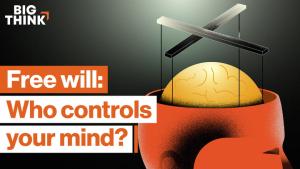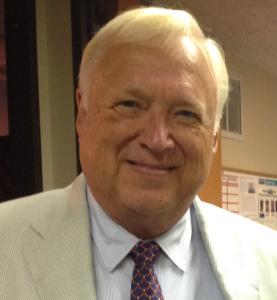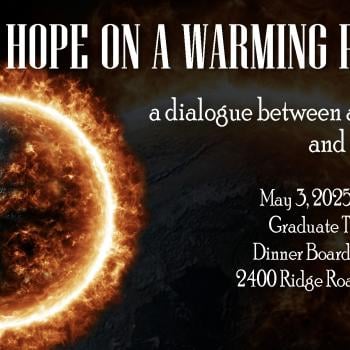Consciousness and Neuroscience in a Physical World
Did I lose my free will to Science?

I’ve been worrying. I’m worried that I’ve lost my free will to science. Here’s how philosophical theologian Nancey Murphy formulates my worry. “The worry is this: if human choices are essentially brain events, and if brain events are governed by the laws of neurobiology, then must it not be the case that all choices and all subsequent behavior are governed by the laws of neurobiology?” (Murphy, 2006, p. 103). Have I lost my free will to the deterministic laws of science?
This post extends a discussion previously begun in “The Danger of Free Will Denial” and “Did I lose my conscious mind to science?”
Free Will. Freedom of Choice. Libertarian Freedom.
What kind of freedom might I have lost to science? It goes by different names: free will (liberum arbitrium); freedom of choice; libertarian freedom; natural freedom; and, of course, disobeying your parents. Free will is the capacity to choose between alternatives unimpeded. According to philosopher Chelsea Haramia, “those who claim that we have libertarian free will argue that we make free choices when it is possible that we could have done otherwise than what we actually did.”
How could I possibly lose such libertarian free will? By having my materialist friends tell me that it’s only a delusion. Allegedly, automatic physical processes are exhaustively determinative of all free decisions. In short, it’s my brain—not my conscious mind—that determines what I do.

Process theologian David Ray Griffin helps us get clear on this. “Freedom, in the sense of self-determination,” says Griffin, “involves a decision among genuine alternatives, so that it is true that the agent could have done otherwise” (Griffin, 1998, p. 37). What we need is a scientific theory or philosophical cosmology to explain freedom, not explain it away. “My argument has been that to be adequate to the facts of our experience a philosophy must provide for human freedom in the metaphysical sense, which involves the denial that antecedent causal forces totally determine our actions” (Griffin, 1998, p. 209).
As we postulated in a previous post, consciousness is a hard-core commonsense notion. We are autoptic witnesses to our own consciousness as well as the consciousness of those whom we know well. This is common sense. Like consciousness, Griffin tells us that freedom is a “hard-core commonsense intuition” (Griffin, 1998, p. 166). Any cosmology that explains freedom away fails to be adequate to reality.
Free Will as Self-Determination
 Note how Griffin connects freedom with self-determination. It has long been my contention that free will is best understood as self-determination. Each of us is a self with agency. We should recognize three components to our daily experience of free will: deliberation, decision, and action. First, we deliberate over alternatives. Second, we decide which alternative to actualize. Then, third, we take action which has an effect on the physical world. Our conscious decision affects the course of physical history.
Note how Griffin connects freedom with self-determination. It has long been my contention that free will is best understood as self-determination. Each of us is a self with agency. We should recognize three components to our daily experience of free will: deliberation, decision, and action. First, we deliberate over alternatives. Second, we decide which alternative to actualize. Then, third, we take action which has an effect on the physical world. Our conscious decision affects the course of physical history.
What freedom understood as self-determination presupposes, then, is the existence of a self. Now, are our scientific materialists going to take away your and my self too? Well, they will certainly try.
Watch out for neurocentrist philosopher Thomas Metzinger. “Subjective experience is a biological data format, a highly specific mode of presenting information about the world by letting it appear as if it were an Ego’s knowledge. But, no such things as selves exist in this world” (Metzinger, 2009, p. 8). Ouch! This intellectual thief has stolen my self. Without a self, I can’t engage in self-determination. I’ve lost my free will to science. Woe is me.
Can any scholar come to my rescue? Neurotheologians such as Nancey Murphy and Warren S. Brown would counter with the likes of Metzinger. “Mental events are not reducible to brain events…mental events are constituted in action loops in which brain processes are interlocked with environmental context, with the history of the outcome of previous action loops playing a primary causal role” (Murphy, 2010, p. 209). Whew! I’ve got my self back again. Hooray![1]
The way to prevent a theft of our free will is to provide a precise definition. Here’s my armor plate: we understand free will as self-determination. Free will is a core autoptic human experience in which the self as agent deliberates, decides, and takes action. Now, I ask you: how could this be denied?
Conclusion
Just in the nick of time, systematic theologians such as David Ray Griffin and Nancey Murphy have rescued both our self and our free will from being jettisoned by neurocentrists defending scientific materialism. Because the self that determines itself and the world (in part) through deliberation, decision, and action is itself a hard-core commonsense intuition, it cannot be dislodged from concrete experience. We’re safe. Whew!
I believe that belief in human free will can be sustained in a deterministic cosmology. We simply need to posit a three factor determinism: nature, nurture, and self. The human self is itself a determinant. What we mean by free will is in fact self-determination.
Now, just to be clear, in this Patheos series we have protected only one kind of freedom, namely, libertarian free will.[3] What we have not done is address distinctively Christian freedom.[4] That will require another treatment in a later article. In the meantime, click on “Did I lose my inborn sense of God to Atheism?”
SR 2003 Free Will and Neuroscience in a Physical World
Here’s what’s coming on the implications of neuroscience and neurophilosophy for Christian anthropology.
Did I lose my Conscious Mind to Science?
Did I lose my Free Will to Science?
Did I lose my inborn sense of God to Atheism?
Did I lose my Self to my Brain?
Did I lose my Self to Determinism?
Did I lose my Self to Christian Freedom?
▓

Ted Peters pursues Public Theology at the intersection of science, religion, ethics, and public policy. Peters is an emeritus professor at the Graduate Theological Union, where he co-edits the journal, Theology and Science, on behalf of the Center for Theology and the Natural Sciences, in Berkeley, California, USA. His book, God in Cosmic History, traces the rise of the Axial religions 2500 years ago. He previously authored Playing God? Genetic Determinism and Human Freedom? (Routledge, 2nd ed., 2002) as well as Science, Theology, and Ethics (Ashgate 2003). He is editor of AI and IA: Utopia or Extinction? (ATF 2019). Along with Arvin Gouw and Brian Patrick Green, he co-edited the new book, Religious Transhumanism and Its Critics hot off the press (Roman and Littlefield/Lexington, 2022). Soon he will publish The Voice of Christian Public Theology (ATF 2022). See his website: TedsTimelyTake.com. His fictional spy thriller, Cyrus Twelve, follows the twists and turns of a transhumanist plot.
▓
Notes
[1] Might a theologian wish to preserve the self who exercises freedom? Yes, indeed. “When God in His supernal goodness creates each soul in His own image,” wrote Maximus the Confessor in the seventh century, God “brings it into being endowed with self-determination” (Maximus, 1981, p. 2:116).
[2] Physicist Henry Stapp turns from the classical physics of Newton to quantum mechanics. Therein he finds at the subatomic level the opening he needs to integrate what we experience as consciousness, free will, and human meaning. “This quantum mechanical conception provides a rationally coherent science-based foundation for human lives suffused with purpose and meaning. A person’s mind acts first to construct, from the clues transmitted by sense organs to that observer’s brain, a conception of the physically described reality in which the person is locally embedded. The person’s mind then directs, in mentally intended ways (via mental efforts that exploit the quantum dynamical laws), that person’s bodily actions. Quantum mechanics thereby provides a rational science-based escape from the philosophical, metaphysical, moral, and explanatory dead ends [of the] classical materialistic conception of the world and our place in it” (Stapp, 2017, p. 80).
[3] Elsewhere I have delineated four concepts of freedom relevant to this discussion: (1) liberty or political freedom, that is, independence from external constraint or coercion; (2) free will or natural freedom, that is, self-determination or the power to choose between alternatives; (3) moral freedom, virtue, or Christian freedom, that is, the capacity to choose the good of God, virtue, or the neighbor over one’s selfish inclinations; and (4) future freedom, that is, creative initiatives that influence the course of future events (Peters, 2nd Ed, 2003, pp. 17-20).
[4] Do not confuse “Christian Freedom” with the libertarian free will debated among Calvinists and Arminians in light of predestination. See: Roger Olson, “Free Will or Not? Another Round in the Free Will Debate.”
References
Crick, F., 1994. The Astonishing Hypothesis: The Scientific Search for the Soul. New York: Scribners.
Griffin, D. R., 1998. Unsnarling the World-Knot. Berkeley CA: University of California Press.
Maximus, 1981. Two Hundred Texts on Theology and the Incarnate Dispensation of the Son of God. In: K. Ware, ed. Philokalia. London: Faber, pp. 2:114-284.
Metzinger, T., 2009. The Science of the Mind and the Myth of the Self. New York: Basic.
Murphy, N., 2006. Bodies and Souls, or Spirited Bodies?. Cambridge UK: Cambridge University Press ISBN 978-0-521-67676-2 pb.
Murphy, N. a. W. B., 2010. Did My Neurons Make Me Do It?. Oxford: Oxford University Press.
Peters, T., 2nd Ed, 2003. Playing God? Genetic Determinism and Human Freedom. London and New York: Routledge ISBN0-415-94248-0-415-94249-7.
Satel, S. a. S. L., 2013. Losing our Minds in the Age of Brain Science. Skeptical Inquirer 37:6, pp. 30-35.
Searle, J., 1986. Minds, Brains, and Science. Cambridge MA: Harvard University Press.
Stapp, H. P., 2017. Quantum Theory and Free Will. Switzerland: Springer.
Whitehead, A. N., 1925, 1997. Science and the Modern World. New York: Free Press.
Woollacott, M. H., 2017. Infinite Awareness. New York: Roman and Littlefield.














